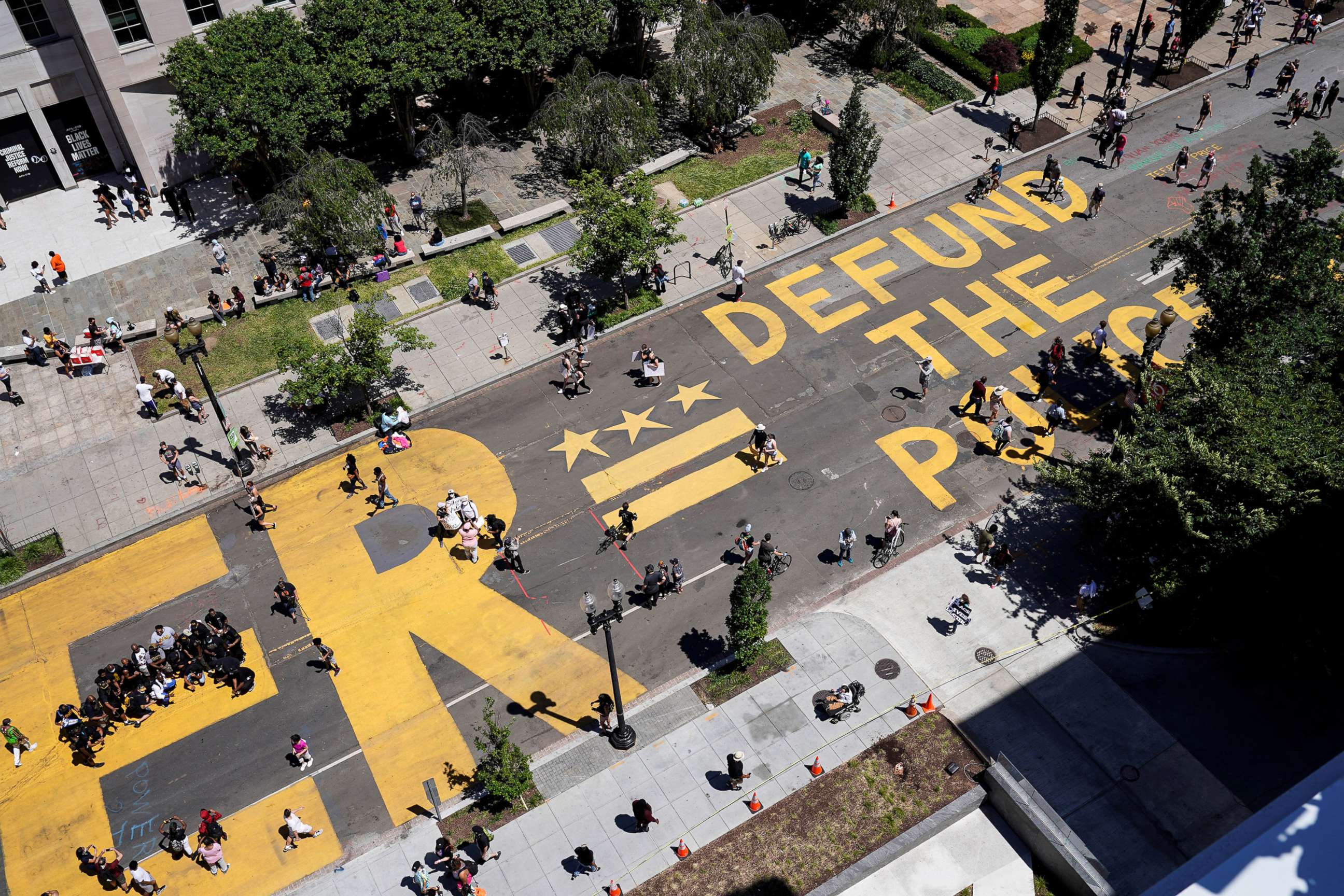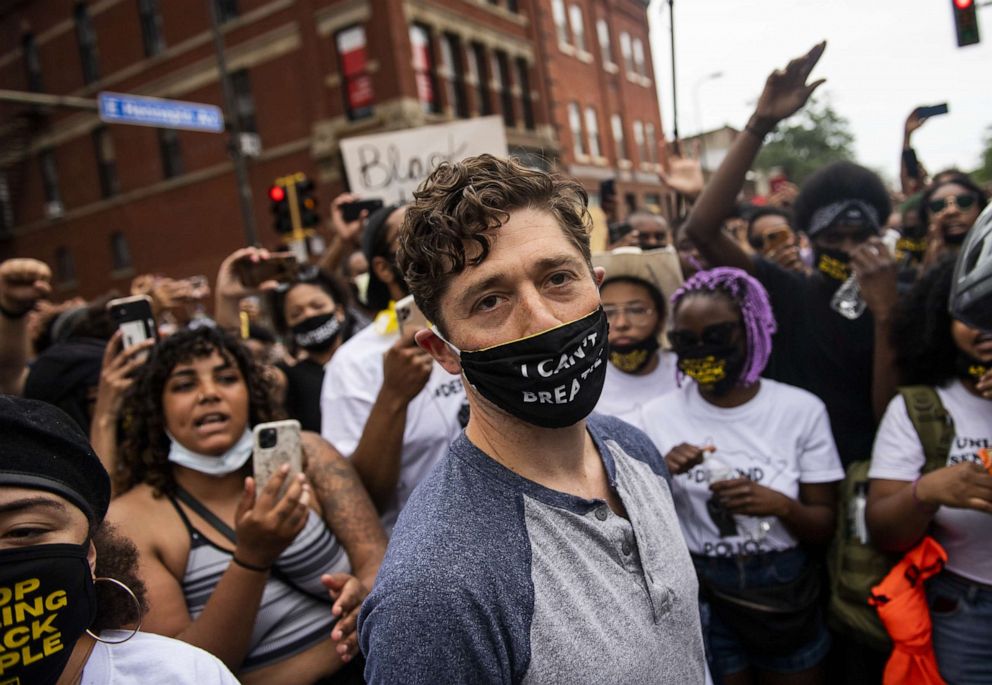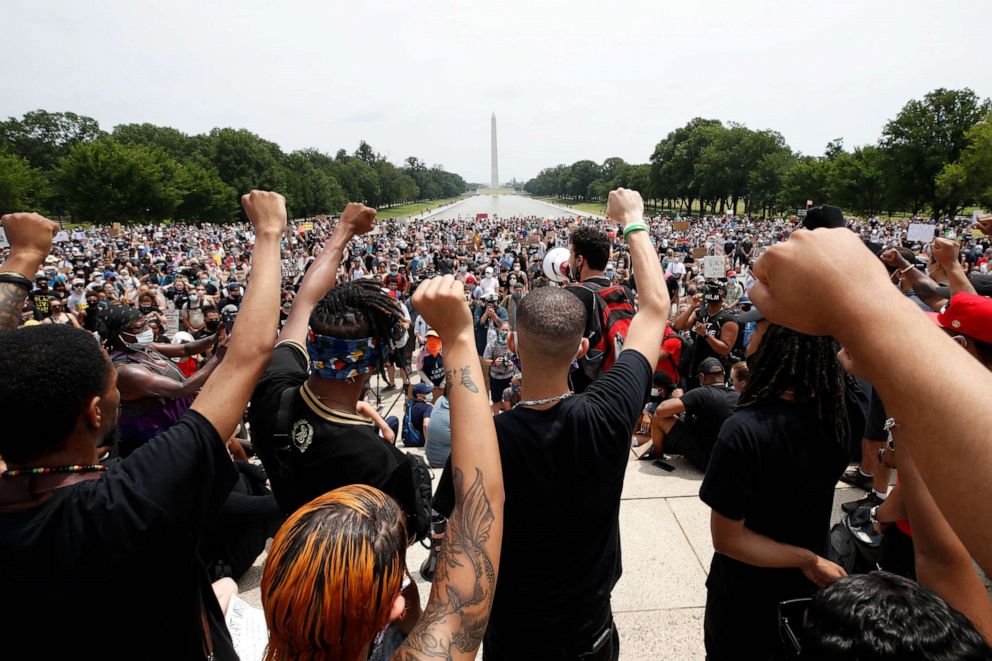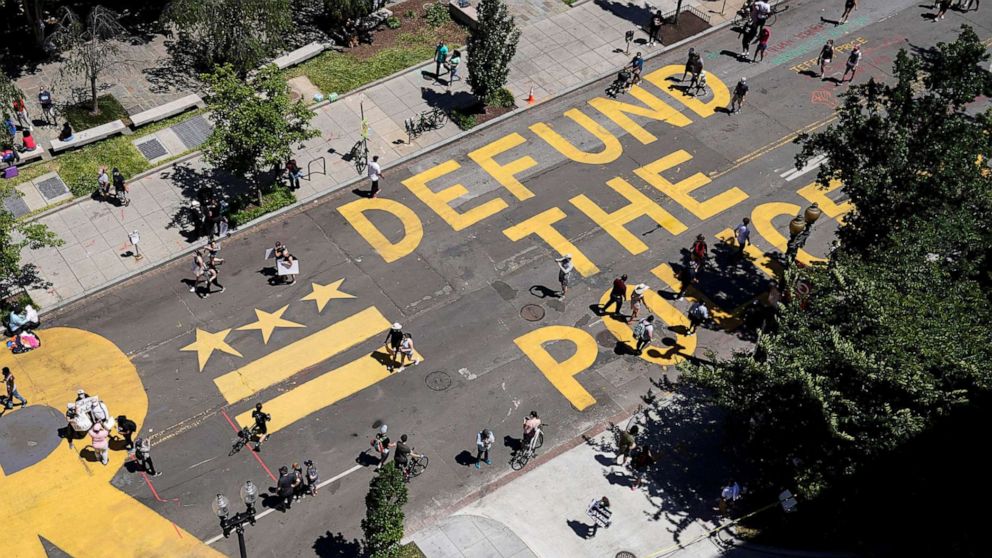Why protesters want to defund the police after George Floyd's death
In Washington, soon after city workers painted "Black Lives Matter" down 16th Street heading to the White House, activists added their own message: "Defund the Police."
The phrase has become a rallying cry in demonstrations against racism and police brutality across the country, two weeks after George Floyd's killing in Minneapolis police custody.
The calls have prompted action in some cities -- from the redirecting of some police funding, to vows to dismantle the entire Minneapolis Police Department.
It has also sparked pushback from the law enforcement community and caught the attention of President Donald Trump, who quickly took to Twitter to mock the idea and accuse Democrats of working to dissolve policing in the United States.

What 'defund the police' means
Advocates say the effort -- after years of policing reforms that haven't stopped the deaths of African Americans in police custody -- is aimed at changing the role of law enforcement in communities in America.
Broadly, they want to redirect police funding to community health, safety and economic programs, in an effort to develop new ways to address drug use, homelessness and other issues police are tasked with responding to in America.
"What I'm calling for is a rethink on why we've turned all of these social problems over to the police to manage," Alex Vitale, a professor of sociology at Brooklyn College and the author of "The End of Policing," said in an interview with NPR. "As we dial those things back, then we can think more concretely about what the rest of policing should look like and how that could be reformed."
Instead of sending police officers to respond to disturbance calls, activists argue, why not send mental health workers or community leaders?
"When there are crises or emergencies in communities, you have people who actually are in those communities who respond to those crises, and usually don't need guns," said Melina Abdullah, co-founder of Black Lives Matter Los Angeles, and professor of Pan-African Studies at California State University, Los Angeles.
Law enforcement resistance
Police unions and some law enforcement experts have pushed back on the still-developing movement, calling the effort ill-conceived and potentially dangerous if implemented.
Jamie McBride, the leader of the Los Angeles Police Protective League, the union representing Los Angeles police officers, accused Garcetti of "political pandering," calling the proposal to cut the LAPD's budget "shameful."
"I would love to see a social worker walk into a domestic violence incident where the husband is beating up the wife, and wife is beating up the husband, and a weapon is present," said Don Mihalek, a retired senior Secret Service agent and ABC News contributor who serves as the executive vice president of the Federal Law Enforcement Officers Association Foundation.
While state and local governments spent $115 billion on police in 2017, according to the Urban Institute, experts told ABC News that because the majority of police budgets fund salaries and benefits, any cuts could impact the quality of police officers.
"If there is defunding of police organizations, we're going to see less training and poor training, and this is the foundation of effective policing," said Maria Haberfeld, a professor at John Jay College of Criminal Justice in New York City.
If there are any budgeting changes to make, they should be done on a case-by-case basis, John Farmer Jr., director of the Eagleton Institute of Politics at Rutgers University and former New Jersey attorney general, told ABC News.
"I would not want to see the budgets cut, and the things being eliminated are measures that ensure accountability," he said. "There may be departments where the money is being spent on surplus U.S. Army equipment."
Cities already taking action
After Floyd was killed, the movement has led to some changes that could impact some of the country's largest police departments.
Los Angeles Mayor Eric Garcetti nixed a planned $250 million boost to the city's police department's budget, redirecting the money to community programs and the city's African American community.
Over the weekend, New York City Mayor Bill de Blasio also said he would reallocate an unspecified portion of the New York Police Department's $6 billion budget for social services.
"I think we can no longer view the police department budget as untouchable, because every effort must be made to invest in all of our communities," New York City Comptroller Scott Stringer, who has proposed cutting the NYPD budget by more than $1 billion over four years, told ABC News.

And on Sunday, a majority of the Minneapolis City Council announced support for disbanding the Minneapolis Police Department, but have yet to outline how the process would work.
"It's no longer sounding like a radical idea. It's sounding like a logical idea for many," said Janeese Lewis-George, an attorney and democratic socialist in Washington, D.C., who won a city council primary last week and supports defunding Washington's Metropolitan Police Department.
"Just like the 1968 Civil Rights Act had to be passed in order to see the protests die down, I think this is a moment where our legislators are going to have to do the same thing," she told ABC News.
Political pushback
Many Democrats have resisted calls to defund police, and are instead pushing reforms aimed at improved transparency and accountability in policing.
"We need a full-on cultural shift in how our police department and departments throughout the country function," Minneapolis Mayor Jacob Frey told ABC News Chief Anchor George Stephanopoulos on ABC's "Good Morning America" Monday. "Am I for entirely abolishing the police department? No, I'm not."
Pushed by Stephanopoulos on some of the changes he would make in light of the calls to dismantle the department, Frey said he would be "going after the police union," and seek changes to more easily fire and discipline officers.
With some progressives, including Reps. Alexandria Ocasio-Cortez, D-N.Y., and Ilhan Omar, D-Minn., in support of defunding police, the White House and Republicans are pushing all Democrats on the topic -- from former Vice President Joe Biden, to rank-and-file Democrats from moderate and conservative House districts.
After Trump attacked Biden on Twitter over the progressive proposal, the presumptive Democratic presidential nominee spoke out against the effort in an interview with CBS News.
"I don't support defunding the police. I support conditioning federal aid to police based on whether or not they meet certain basic standards of decency and honorableness," he said.
As they introduced new sweeping policing reforms on Capitol Hill Monday -- which include imposing tighter conditions on federal policing funds -- Democratic leaders also stopped short of backing the defunding movement.

"Funding of police is a local matter, as you know. From the standpoint of our legislation, we're not going to that place," House Speaker Nancy Pelosi, D-Calif., said on MSNBC.
House Democrats later discussed the defunding debate on a conference call, with House Majority Whip Jim Clyburn, D-S.C., warning members against using the defunding rhetoric, according to a Democratic aide.
Can defunding a police department work?
Some cities have already dramatically reshaped policing, with some results.
Camden, New Jersey, a city outside Philadelphia, has seen significant drops in the murder rate and violent crime since the police department dissolved in 2013, and merged with the county. Officers were encouraged to walk the neighborhoods, build relationships in the community and were trained to prioritize de-escalation.
"We just completely redefined the expectations of police and how we would perform in society," Scott Thomson, the former police chief, told ABC News.
While many cities across the country grappled with unrest and clashes between police and demonstrators at the start of protests over Floyd's death, Camden has remained relatively peaceful -- which Thomson described as the "return on the investment in community policing."
As for calls for defunding police, Thomson said communities must first "have in place the social services that you no longer want it to be the responsibility of the police to handle."
"If it comes to mean not having police at all, I think it's just silly and Pollyannish idea," Farmer, the former New Jersey attorney general who presided over reforms of the state police, told ABC News. "If what it means is reconfiguring the mission to align with expectations, then I think that's the right approach to take."
ABC News' Ella Torres contributed to this report.
This report was featured in the Tuesday, June 9, 2020, episode of “Start Here,” ABC News’ daily news podcast.
"Start Here" offers a straightforward look at the day's top stories in 20 minutes. Listen for free every weekday on Apple Podcasts, Google Podcasts, Spotify, the ABC News app or wherever you get your podcasts.




